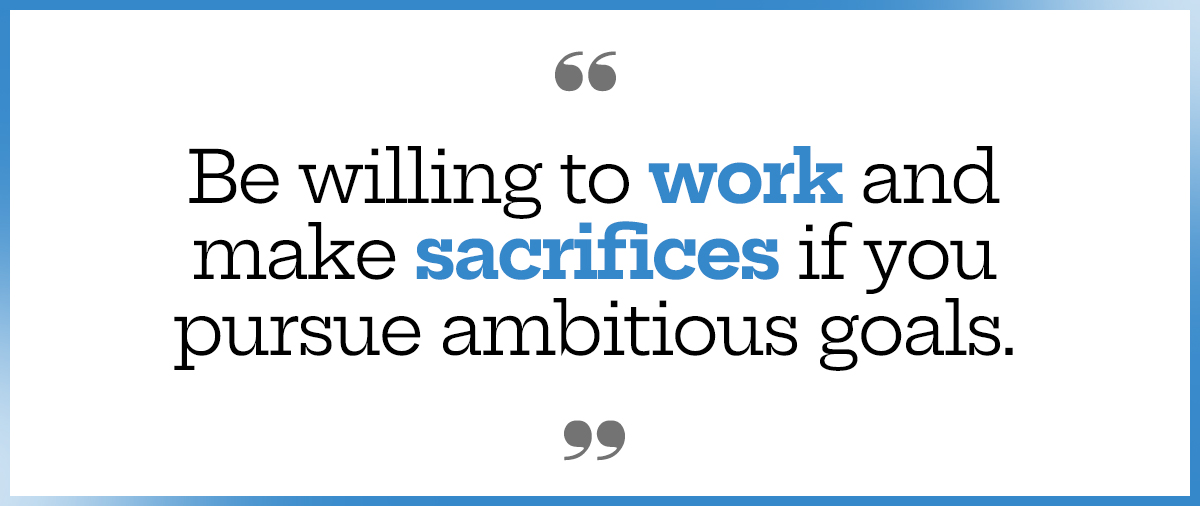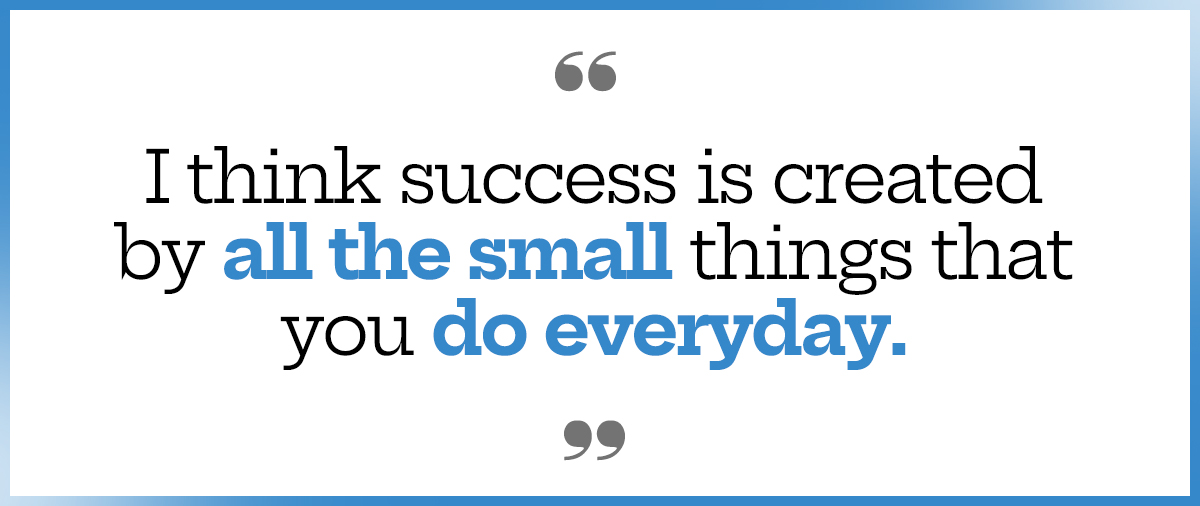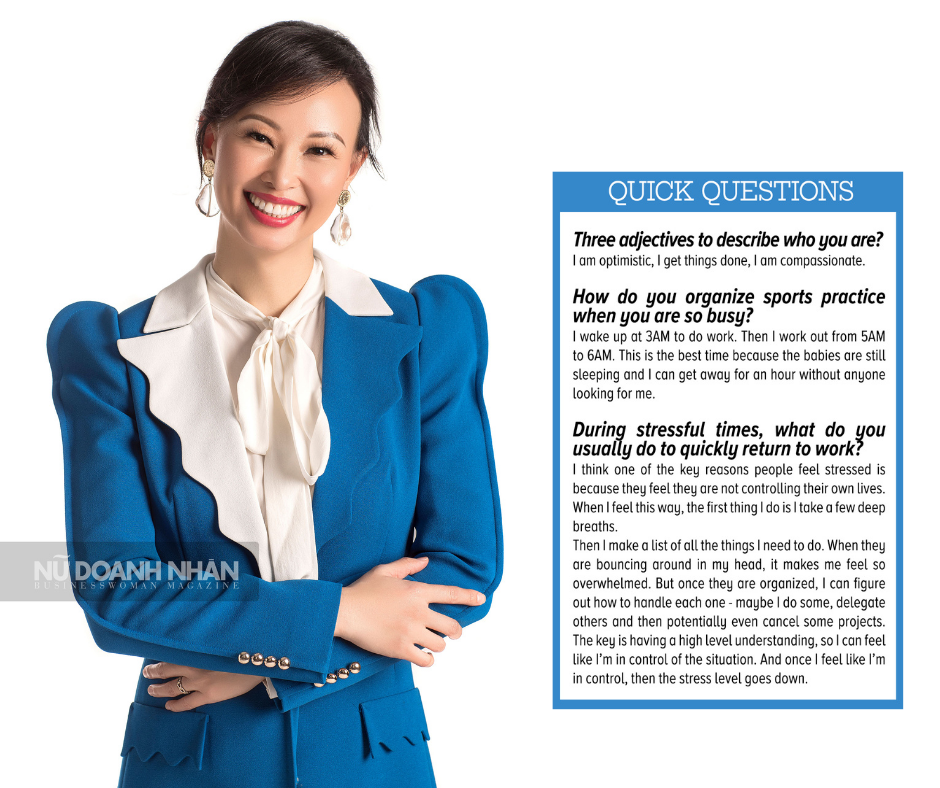It was not clear what success would look like in her twenties, but Thái Vân Linh had learned that it was only through hard work that she be able to achieve her goals in life. Through her perseverance and dedication, she has become a mentor and a role model for many people who seek to define the word “success”.


Hello Shark Thai Van Linh! After coming back to Vietnam many years ago to live and work, how has your career development plans changed since the early days?
I have always been very passionate about the world of start-ups. My career has developed in this direction, focusing on harnessing the power of leaders to create sustainable businesses. That focus and direction is still very strong and even more so now. A person can only succeed once they are able to define their career and life goals, and I want to help them find that clarity. Looking back on my journey over the past 20 years, the main factors that have helped me reach my goals are mindset and motivation. When we think positively, we feel more motivated.
I have recently become more interested in the concept of “motivation”. Years ago, I was not focused on finding ways to increase my motivation because I thought motivation was something that is inherent to a person. However, after recently giving birth to my second baby, I noticed a dramatic decrease in my motivation levels. So I started to read about the theories and lessons from experts in psychology and life skills. I found many methods to help me focus more on work as well as continue on the journey of figuring out life with a career and a family with young children.
To become the known businesswoman that you are today, how do you define positive thinking?
I always build things up little by little. I think success is created by all the small things that you do everyday, even if it is just 20 minutes per day. After 1 year, 5 years or 10 years, it will all add up and front that you will be able to create your own success. By the same token, creating success cannot come without moments of failure. Failure is the result of the little things you forget to do or choose not to do because you are “tired” or “did not have time”. As the years pass by, all those seemingly little things become habits that will eventually make your career stagnant and less successful.
What are your thoughts on how a person should make decisions to ensure that their career progresses in the right direction? Should each step be controlled and cautious, or should they be fast and potentially risky?
When it comes to our careers, I think we should go as fast as possible. Oftentimes, success comes from many lessons, including the failures we have learned along the way. Of course, no one is aiming to fail, but if we try and still fail, it will be valuable “data” for us to benchmark in our next try.
Risk in itself is not a bad thing. Even in investing, the higher the risk, the more attractive the profit will be. It is important to make sure we accept a calculated risk and that there are contingency plans in place to deal with any problems as they arise. With that said, one of the best ways to reduce your risks is to work with people you trust and who have relevant experience.

At each milestone in your life, your career destination has probably changed a little bit. What does shark Thái Vân Linh think will help others to make their career-changing decisions?
I am an analytical person, I believe in facts and logic. So the first thing I always do when faced with important decisions is to make a list of pros and cons. Then I talk to people who I trust and add their thoughts to that list. One thing I often see in any decision that is so important that it can change the direction of my career or life is that the list of pros and cons always seem to come out equally divided. So after all the analysis, I end up relying on my intuition to make the final decision.
We only have one life to live and I want to live a life with no regrets. Most people at the end of their life regret the things they did not do more than the things they tried and failed at. Life is enriched by the experiences you gain along the way. So for me, I always choose the path that leads me to new experiences, even if it means giving up a stable job with a desirable position and high salary in a well-known and established corporation.

Having worked both abroad and in Vietnam, what strengths and weaknesses do you see in Vietnamese businesses? How important is the executive leadership style of the owner or the head of the company?
I think whether a business is in Vietnam or anywhere else in the world, they all face very similar problems. How do they create a product that customers are willing to pay for? How do they identify and then engage their target customers? How do they retain and promote top HR talent? So in terms of the strengths and weaknesses of companies, I don’t think it’s a matter of where the company is located.
It is in this unique mix of challenges that forces business leaders to differentiate themselves. I believe that the top management team sets the expectations and culture for the company. Their ability to succeed at this role will create a company that will either innovate to outpace the competition, or fade into obscurity.
During your many years in a senior management position, what is your consistent management style?
I am very fortunate to have had wonderful managers in my younger years. They were always patient, open to training the team under them, and at the same time, constantly motivating and encouraging us to always do our best. So when I became a manager, I also tried to apply that same leadership style. I believe people respond better in an environment that promotes healthy and friendly competition. Science proves that some stress will help motivate us to work faster and think more creatively. But too much stress can backfire. As a leader, my main goal is to find the right balance to keep my team motivated and striving to improve ourselves and our results.
Have you ever made any mistakes in your role as a boss? How can a leader or a business owner own up to their mistakes?
Of course! My career is also full of mistakes (laughs). Thái Vân Linh thinks the best thing a leader can do is encourage a culture of learning, openly admit mistakes, and discuss ways to improve. One of the beliefs I am always reminding myself of is, “You do not know what you do not know”. This is true in life and in business as well. And especially in the operation of a business, as the company grows, the management team has less direct access to detailed day-to-day issues. As such, hiding or covering up mistakes can gradually become easier and more common. This could lead to a missed learning opportunity, or worse, a crisis that could have been avoided if the business leader was made aware from the beginning. So I think it is very important to create a corporate culture where everyone can feel safe making mistakes and talking about those mistakes.

What is your top criterion when building your team?
I think everyone has the potential to learn and advance in their careers. I am a manager who is very patient with the learning process. Therefore, the first thing I always look for when building my team are people with a growth mindset. Next is a strong work ethic, the ability to firmly dig into a problem, and of course, a good attitude.
What advice does shark Thái Vân Linh have for young people to help them set attainable goals and avoid setting expectations that prove to be delusional?
I think it is great that people pursue ambitious goals. I don’t think of it as being delusional. If you have a dream, you can make it a reality if you focus and do everything in your power to work toward that goal.
In addition, you need to maintain a positive mindset. Every action starts with a thought. You need to train your brain and your thoughts – visualize your success and visualize the actions you have to take. Once you have a clear picture of what you want, you need to focus and act. Be willing to work and make sacrifices.
Don’t be afraid to ask for help. Understanding when and who to ask for help is a difficult skill to master. But it becomes easier if you start with a curious mindset and an open mind. And talk with as many people as possible.

As a businesswoman, a speaker, and a community activist, how does shark Thái Vân Linh have time for everything?
I firmly believe that your morning routine sets the tone for the rest of your day, so I have been a morning person for the past 10 years. One thing that I recently started doing is waking up at 3 a.m. The quiet early mornings afford me time for myself – I start by reading my goals and setting my intentions for the day. Then I spend time writing and doing tasks that require creativity and deep thinking. This habit helps me to work a lot more efficiently, while also allowing me time with my family.
Having lived abroad since childhood, do you consider yourself a traditional or a modern woman?
I think I’m the type of woman who does the things that need to be done to support my family, and at the same time, I make sure I am also happy. Women in history have always been strong and devoted to their family. However, they often lose themselves in the process.
Nowadays, women’s lifestyles are playing out on the opposite side of the spectrum. Women are more focused on achieving their personal goals than on creating a family. Another approach I’ve heard many women say is that we can have it all – career and family, friends and hobbies. However, we just can’t have them all at once.
But as a wife, a mother and a professional, I don’t want to accept that I cannot have a close relationship with my family and a flourishing career, at the same time. I think it is important that we strive to achieve happiness in both life and work. I do not believe that I would be truly happy without both my family and my career. So I am working extremely hard to nurture my family, as well as proactively taking control of my personal life. It sometimes feels like I’m treading water, but I’m happy that I’m at least still floating (laughs)!

But there is only so much time in a day, how do we pursue both of these goals?
The concept of a 24-hour day is something humans created because it takes the Earth 24 hours to complete a rotation. But I thought, if that concept comes from subjective human thinking, then why don’t we humans try to think differently?
I am trying to live as if there were only 6 hours a day, and so within a typical 24-hour day, I now have 4 smaller “days”. Putting aside 6 hours to sleep, I have 3 smaller days in a normal day. This method pushes me to work as quickly as possible to get everything done that “day”. It’s like if you are running a race. If you were to run a marathon, you would run slowly and pace yourself to be able to finish the entire 42 km. But if you were to run a 500-meter sprint, then you would most likely run as fast as you can from the start.
So if each “day” was only 6-hours, we must “run”?
You have to be fully focused and work at a faster pace to get everything done in 6 hours instead of the usual 24 hours. Once you’ve trained yourself to get used to the new time slots, you have up to 3 “days” to work in the same 24 hours as everyone else. And that means you can get 3 times more work done than someone who lives a normal 24-hour day.
I think this is an interesting concept and am currently trying it. And I have found that I have more time for work, for family and for myself.
At work, shark Thái Vân Linh certainly have principles for training your team. In your family, do you have any principles when it comes to teaching your children?
For me, the key qualities I want my daughters to have are optimism, a strong work ethic, confidence and compassion. I believe that if they demonstrate these traits, they will be able to overcome any challenge life brings their way.
To encourage my 5-year-old daughter to think about these qualities, my family started an exercise that we do at her bedtime – positive affirmations. She says phrases such as: “I am confident.”, “I like to try new things.”, “I work very hard.”, “I keep trying and trying.”
I believe every action starts with the way we think. If I can train her mind to be positive while her brain is still developing, then this will be a solid foundation for anything else she learns in the future.

Text: JENNI VÕ, HỒNG ĐẶNG | Translated by HÒA TÔN | Creative Director: HIEPLEDUC | Photo: CHANH NGUYỄN | Stylist: ĐỖ ĐĂNG KHOA | Make up: VIỄN DƯƠNG | Outfits: MOSEF, WEPHOBIA, DUNE LONDON
Copyright© All Rights Reserved.

Read more:

